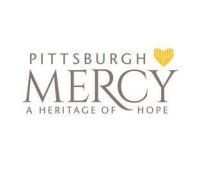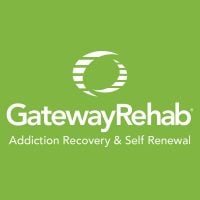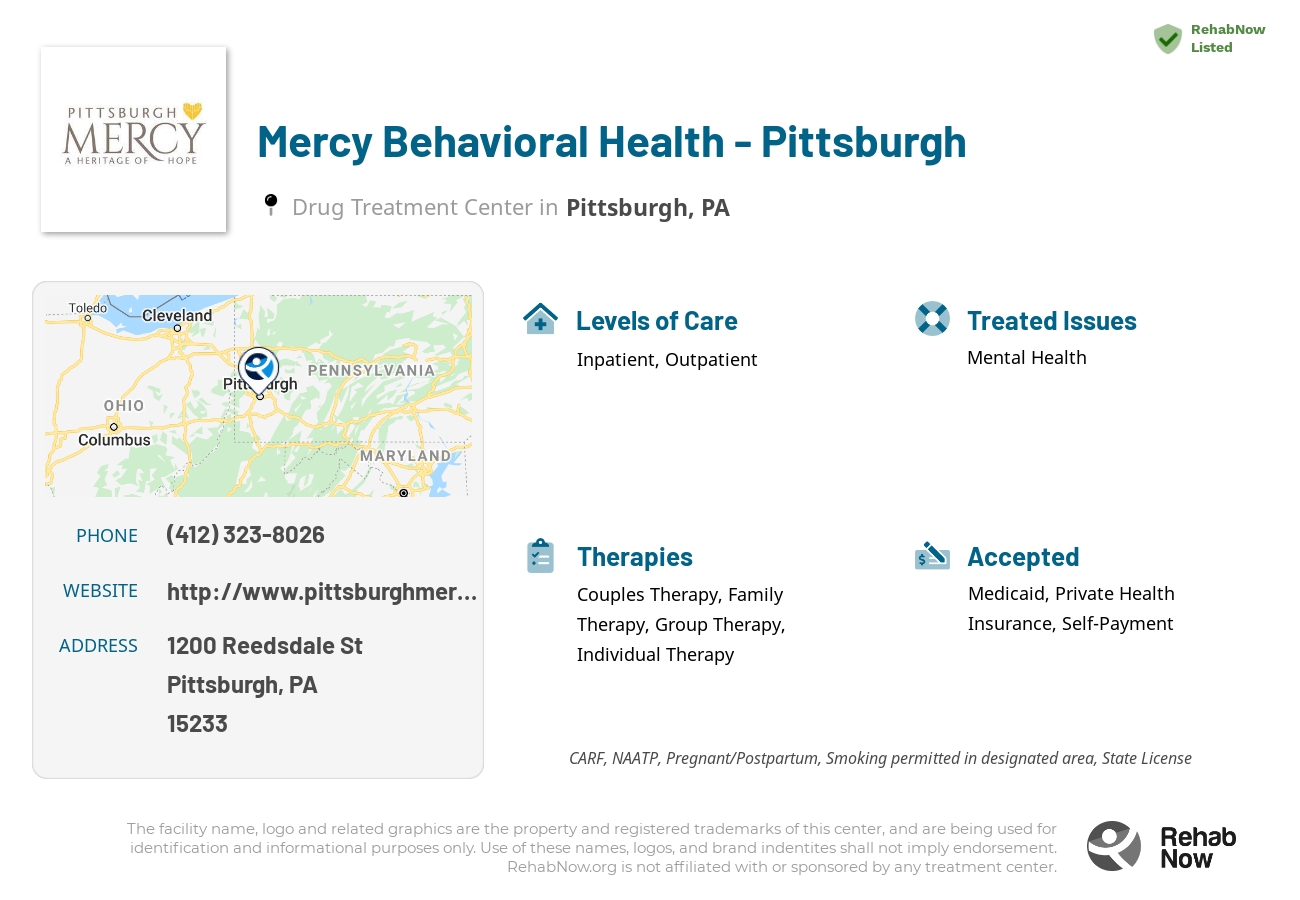
Mercy Behavioral Health - Pittsburgh
Drug Rehab Center in Pittsburgh, Pennsylvania
- Mental Health
- Eating Disorder
- Dual Diagnosis
- Drug Addiction
Mercy Behavioral Health - Pittsburgh is a CARF-accredited Addiction Treatment Facility that provides comprehensive, private health insurance accepted, evidence-based treatments and various levels of care such as inpatient, outpatient, partial-hospitalization and residential services to individuals seeking sobriety from substance use disorder and mental health issues.
About This Pennsylvania Facility
Mercy Behavioral Health - Pittsburgh is an accredited health care facility that focuses on providing quality treatment for individuals facing drug addiction, eating disorders, mental health issues, and dual diagnosis. Offering multiple levels of care, Mercy Behavioral Health - Pittsburgh uses a wide range of methods and treatments to address various issues and addictions. The facility provides both inpatient and outpatient care, as well as partial-hospitalization and residential care, to help patients reach a lasting recovery.
At Mercy Behavioral Health - Pittsburgh, patients have access to individual and couples therapy, family therapy, interventions, and cognitive behavioral treatment. The facility also offers counseling to children and adolescents, intensive outpatient care, sober living programs, and DUI/DWI screenings and assessments. With a team of experienced professionals, Mercy Behavioral Health - Pittsburgh provides treatment plans that focus on each individual’s needs, helping them address their issues, heal, and rebuild. Private health insurance is accepted at the facility.
Genders
Ages
Modality
Additional
Accreditations

CARF
The Commission on Accreditation of Rehabilitation Facilities (CARF) is a non-profit organization that specifically accredits rehab organizations. Founded in 1966, CARF's, mission is to help service providers like rehab facilities maintain high standards of care.
Conditions and Issues Treated
Levels of Care Offered at Mercy Behavioral Health - Pittsburgh
This center offers a variety of custom treatment tailored to individual recovery. Currently available are Inpatient, Outpatient, Partial-Hospitalization, Residential, with additional therapies available as listed below.
Inpatient rehab programs like what’s offered at Mercy Behavioral Health - Pittsburgh in Pittsburgh, PA are ideal for covering all the bases that surround one’s addiction. It’s considered the most comprehensive approach to care for people afflicted with addiction. Patients live in a facility where they have access to therapy and medical care 24/7.
Outpatient treatment is treatment that occurs when a patient is not checked into a rehab facility. The patient may show up for therapy sessions, go through detox and engage in other therapies to help them recover. However, they will do so while they live at home in Pennsylvania.
Outpatient therapy provided by Mercy Behavioral Health - Pittsburgh is usually recommended as a follow up to inpatient therapy. It helps patients adapt to their normal lives after treatment. In some cases, it can also be an alternative to inpatient treatment. People may choose this route if they are unable to leave their jobs, children or if they don’t have the money for inpatient treatment. However, inpatient treatment is the best way to recover from addiction.
Mercy Behavioral Health - Pittsburgh‘s Partial Hospitalization Program is a midway point between inpatient and outpatient treatment. It is for people who are still struggling with addiction but don’t need round the clock care in Pittsburgh. Patients may spend anywhere from 18 to 30 hours a week in a treatment program, but they will sleep at home. The duration of the program can be anywhere from one to six months.
Residential treatment programs are those that offer housing and meals in addition to substance abuse treatment. Rehab facilities that offer residential treatment allow patients to focus solely on recovery, in an environment totally separate from their lives. Some rehab centers specialize in short-term residential treatment (a few days to a week or two), while others solely provide treatment on a long-term basis (several weeks to months). Some offer both, and tailor treatment to the patient’s individual requirements.
Therapies & Programs
Individual professional counseling or individual therapy refers to the one-on-one interaction between a patient and his or her counselor. Individual therapy allows for more privacy, one that group interactions can’t provide. Therefore, it becomes easier for a person to unload and become more open to his or her counselor.
Another benefit of individual therapy at Mercy Behavioral Health - Pittsburgh in Pittsburgh, PA is that all sessions aim to speed up a single person’s progress. It makes it easier for the counselor and the patient to deal with the central issues, which are likely the culprits of substance addiction.
Once the roots of the problems are addressed, it becomes less challenging for a recovering patient to maintain sobriety and brush off temptations.
Families are not always as supportive as they could be, but by opting for family therapy, many recovering addicts are able to understand their addiction and get the support they need to get sober. These therapy sessions at Mercy Behavioral Health - Pittsburgh in Pittsburgh, PA involve all members of the family who play a role in the recovering person’s daily life. They work together to overcome past issues, avoid triggers, and remain strong and supportive of each other.
In group therapy, the patient undergoes sessions with other patients dealing with similar problems under the guidance of a trained counselor. The members of the group interact with each other and talk freely about their issues. The recovery of members of the group from the problems that they face gives the patients confidence that they can also overcome their addiction.
Group therapy at Mercy Behavioral Health - Pittsburgh reduces the feeling of loneliness and improves the coping skills of the patients. Group therapy provides patients with continuous feedback from other members. The group dynamics ensure that members start having some structure and routine in their lives.
Cognitive behavioral therapy (CBT) is a way of addressing concerns through talking. Talking through issues can identify sources of discomfort or unhealthy thoughts. CBT is a healthy way Mercy Behavioral Health - Pittsburgh addresses some behaviors which may be bringing unintended consequences in a persons life.
Payment Options Accepted
For specific insurance or payment methods please contact us.
Is your insurance accepted?
Ask an expert, call (888) 674-0062
Additional Details
Specifics, location, and helpful extra information.
Pittsburgh, Pennsylvania 15233 Phone Number(412) 323-8026 Meta DetailsUpdated November 25, 2023
Staff Verified
Patient Reviews
There are no reviews yet. Be the first one to write one.
Pittsburgh, Pennsylvania Addiction Information
Pennsylvania ranks 14th in the nation for drug-related deaths. More than 10% of all deaths in Pennsylvania have been related to drugs and alcohol. 30% of Pennsylvania youth reportedly drink alcohol monthly, with more than 20,000 teenagers having an alcohol problem. The rate of opioid misuse in Pennsylvania is double the national average.
Pittsburgh, Pennsylvania, has been hit hard by the opioid epidemic. About 24,000 people in Pittsburgh struggle with drug addiction. In the city, there were 9,813 overdose deaths in 2016. Alcohol is a factor in more than 38% of all traffic fatalities in Pittsburgh. There are plenty of drug treatment centers in the area to help you get your life back on track.
Treatment in Nearby Cities
- Willow Grove, PA (259.5 mi.)
- Mount Pocono, PA (248.2 mi.)
- Bala-Cynwyd, PA (254.7 mi.)
- Columbia, PA (187.8 mi.)
- Westfield, PA (164.4 mi.)
Centers near Mercy Behavioral Health - Pittsburgh



The facility name, logo and brand are the property and registered trademarks of Mercy Behavioral Health - Pittsburgh, and are being used for identification and informational purposes only. Use of these names, logos and brands shall not imply endorsement. RehabNow.org is not affiliated with or sponsored by Mercy Behavioral Health - Pittsburgh.





